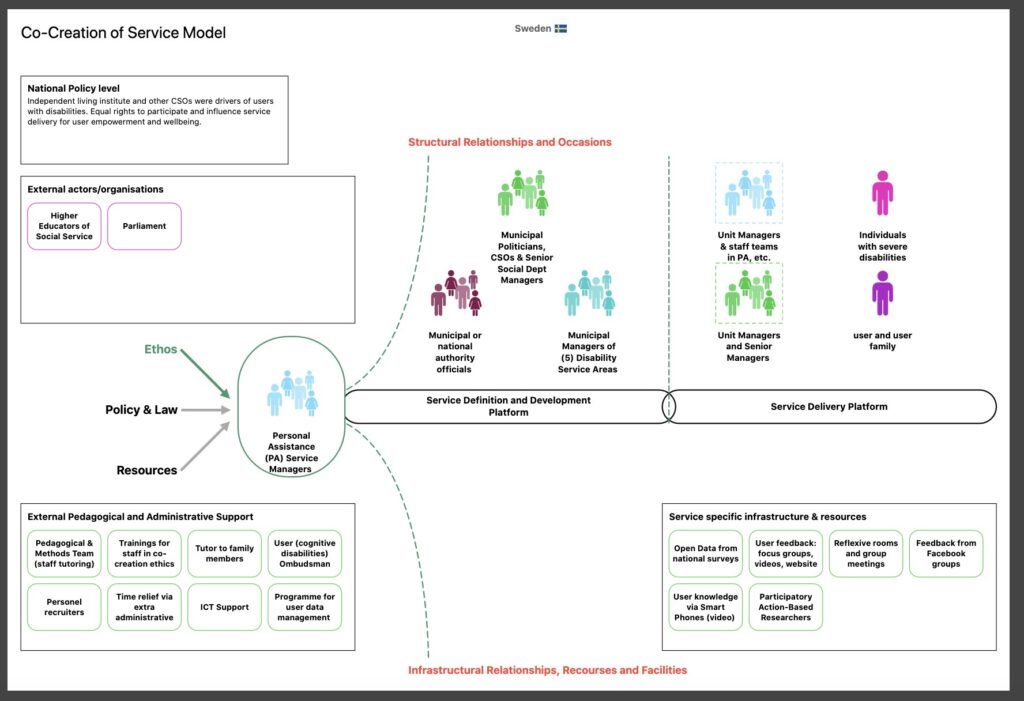Contextual aspects; drivers and brakes
Mapping out stakeholders and relationships in service co-creation
To help each service innovation pilot analyse the dynamic between stakeholders in each local service context and explore how their roles and relationships work or can be improved in co-creation of new services or innovative improvements Living Labs can be used. The Living Labs enable organisations to ask reflective questions about facilitators and hinders to co-creation in terms of stakeholders, roles, relationships, resources and tools and contextual factors, such as available information, legal or policy environment.
It helps to analyse all these factors with the help of conversations based on symbolic, thought provoking pictures and accompanying questions with the stakeholders in an organisation or a multi-organisational service system.
In CoSIE project, we have developed an innovative digital tool (called Cosmos) that helped pilots better map out their stakeholder relationships and resources visually and explore other change related questions. Below is a screen shot from the Cosmos tool of the Swedish pilot that illustrates the possible format for mapping out stakeholder relationships. Guided by such maps the conversations of change may reach a deeper level and consider broader change processes involved than would be normally possible without a good mapping or visualisation tool and facilitative questions. Put this in consistent way it becomes possible to better explore the factors affecting local contexts and also make comparisons between pilot cases to identify new ones.
By reflecting on the nature and dynamics of the stakeholder relationships, roles, resources and tools stakeholders may create a more thorough theory of innovative change that accommodates co-creation with beneficiaries than would be possible in ‘normal’ unfacilitated by such tools conversations.
A map of stakeholder relationships in co-creation of personal assistance for people with disabilities in the Swedish pilot (in Cosmos tool)

Co-creating parties and target groups in the pilot
Target group are adult citizens (aged 18-65) with a variety of physical and cognitive disabilities who live in their homes or in group housings and are in need of various assistance to manage their daily lives and participation in society.
Co-creating parties are decision-making officials, street-level executives/managers, service providing personnel and users (often user representatives or relatives). Additional stakeholders may be pedagogical tutors (employed by Disability Services) and higher-level managers.
National policy and actors
In Sweden, after a several decades of passivating care approach where people with disabilities were seen as only able of passively receiving support (transactional service approach), civil society representatives and national parliament have in 1993 agreed to aim at closing the gap between individuals with physical and cognitive disabilities and those with no disabilities. This responsibility includes boosting each individual’s self-determination, prospects of living an independent life and exercise of citizenship.
By a complementary legislation The Act Concerning Support and Service for Persons with Functional Impairments individuals with serious functional and cognitive disabilities as service beneficiaries are since 1993 recognized a novel right of participation and influence (co-determination) in those social locally provided assistance services that they are entitled to, such as personal assistance.
It includes the right to influence personnel recruitment, the drafting and implementation of their personalized assistance plans and overall daily assistance. “Service beneficiary shall to the greatest extend be given the right to influence and co-determine the services she is eligible to” with the aim to increase service beneficiary power, health and well-being.”
Ministry of Education and the Swedish National Board of Health and Welfare (‘Socialstyrelsen’) are two other institutions steering the implementation.
Decision-level actors
- Municipal political boards
- Social and disability service managers
- Municipal or national authority officials
Service-level actors
- Staff who often work in small teams to provide assistance services to individual user
- First line managers who are primarily responsible for service implementation and improvement work in smallest organizational units
- Pedagogical tutors employed by the organization (called Team Support and Methods/TSM) to serve entire disability services, their street-level managers and personnel
(A hyperlink to Cosmos tool and questions about co-creation context?)